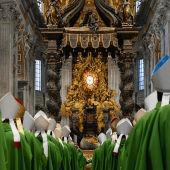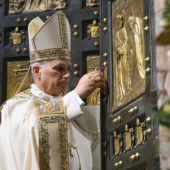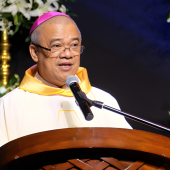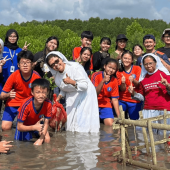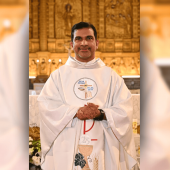Kazakhstan: Papal visit as "Pilgrim of peace, seeking dialogue and unity"
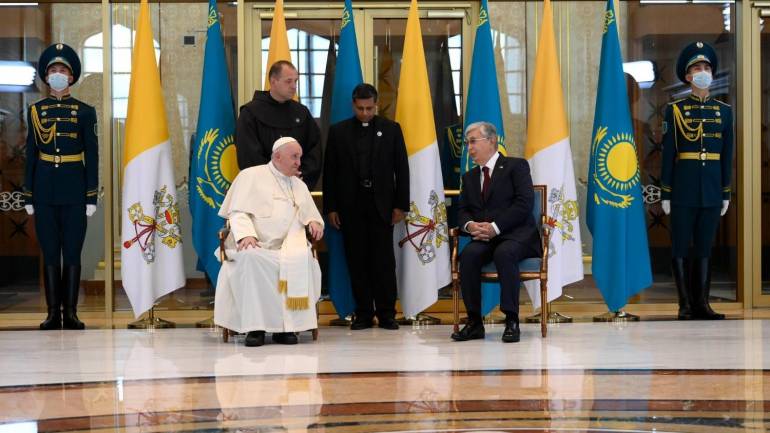
During a courtesy meeting with authorities, civil society, and the Diplomatic Corps, Pope Francis expressed his "honor" for his presence in Nur-Sultan as "a pilgrim of peace, seeking dialogue and unity" on September 13.
He stressed that the world needs peace and to "recover its harmony."
The papal visit is a "pilgrim of peace" because it is focused on peace, unity, and interreligious dialogue.
Pope Francis is in Kazakhstan to attend the 7th Congress of Leaders of World and Traditional Religions. The visit is from September 13 to 16.
The Pope lauded, "Thinking specifically of global commitment to peace, I express deep appreciation for Kazakhstan’s decisive repudiation of nuclear weapons and its efforts to develop energy and environmental policies centered on decreased dependence on carbon fuel and investment in clean sources of energy."
To possess peace, harmony is an indispensable element. The Pope urged all to find harmony, as they did in their history and traditions.
The Pope reflected on "the dombra" that the two parallel strings can symbolize the harmony between Kazakhstan's freezing winters and scorching summers, between modern and historic cities, and above all, we can hear the "notes" of two souls, Asiatic and European, which give it a permanent "mission of linking two continents."
The dombra is the Middle Ages' Kazakh traditional instrument and one of the important national symbols. It is a two-stringed musical instrument played by plucking its two strings.
The Pope figuratively used "the dombra" as a symbol of continuity in diversity, one that links the past to the present through the recitation of sagas and poetry.
Kazakhstan is "a unique multiethnic, multicultural, and multi-religious laboratory and discloses its particular vocation, that of being a country of encounter," due to the 550 ethnic groups and over 80 languages in the country.
The Pope stressed the commitment to interreligious dialogue as a seed of hope sown in the common soil of humanity.
The Pope said that his presence in the country was "to emphasize the importance and the urgency of this aspect of encounter, to which the religions are called especially to contribute."
He added that religious freedom represents "the best channel for civil coexistence."
"It is up to us to cultivate those seeds for the sake of future generations, for the young, whose desires must be seriously considered as we make decisions affecting the present and the future," he said.
The Pope recalled "a glorious history of culture, humanity, and suffering" in Kazakhstan.
The word "Kazakh" refers to walking in freedom and independence.
The Pope recalled the prison camps and mass deportations in the nation’s history, but "Kazakhs did not let themselves remain prisoners of these injustices: the memory of your seclusion led to a deep concern for inclusion," he said.
The pope urged that the past experiences of suffering and trials might inspire the future to the absolute priority of human dignity, the dignity of every man and woman, and every ethnic, social, and religious group.
The Pope praised, "I wish to express appreciation for the affirmation of the value of human life embodied by the abolition of the death penalty in the name of each human being’s right to hope."
Kazakhstan President Kassym-Jomart Tokayev signed the bill into law to end the death penalty for all crimes stipulated in the Criminal Code and replace it with life imprisonment on December 29, 2021.
The Pope supported their work for a process of democratization in the country "to strengthen the competencies of the Parliament and the local authorities and, more generally, a greater distribution of power."
"This is a meritorious yet demanding process," said the Pope, "and it requires perseverance towards the goal without turning back." - With input from Vatican News
Radio Veritas Asia (RVA), a media platform of the Catholic Church, aims to share Christ. RVA started in 1969 as a continental Catholic radio station to serve Asian countries in their respective local language, thus earning the tag “the Voice of Asian Christianity.” Responding to the emerging context, RVA embraced media platforms to connect with the global Asian audience via its 21 language websites and various social media platforms.









